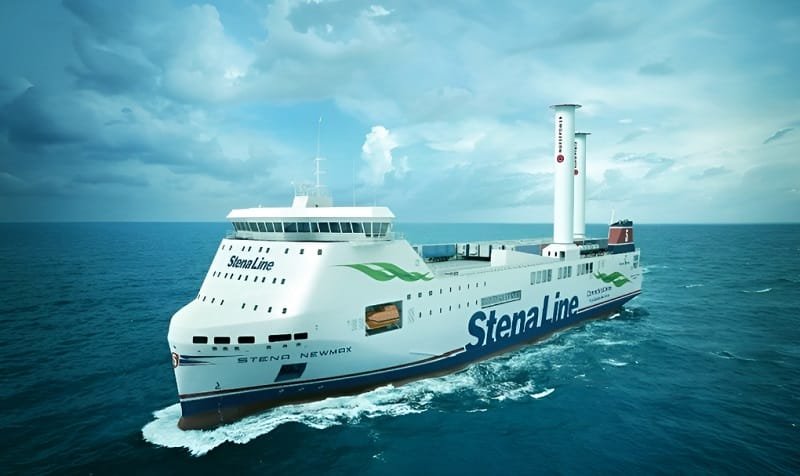Stena Line, one of Europe’s leading ferry companies, has teamed up with Norsepower, a leader in wind propulsion technology, to integrate Norsepower Rotor Sails™ on their new methanol hybrid roll-on/roll-off (RoRo) vessel, Stena Connecta. This collaboration marks a significant step towards Stena Line’s goal of reducing its carbon dioxide emissions by 30% by 2030 and aligns with the global maritime industry’s growing push for sustainability.
Table of Contents
New Methanol Hybrid RoRo Vessel, Stena Connecta, to Feature Wind-Assisted Propulsion
Under the new agreement, Stena Line will install two 28×4 meter Norsepower Rotor Sails™ on the Stena Connecta, a 147-meter-long vessel currently under construction at Jinling Weihai Shipyard in China. The installation of the Rotor Sails™ is expected to provide up to 9% fuel savings on the vessel’s planned route, which will operate between Belfast and Heysham in the Irish Sea. This region is known for favorable wind conditions, making it an ideal location for wind-assisted propulsion.
Scheduled for delivery in Q4 2025, the Stena Connecta will be equipped to run on methanol, a low-carbon fuel that is a key part of Stena Line’s strategy to transition to renewable energy sources. The introduction of Norsepower Rotor Sails™ on the vessel is part of a broader initiative to integrate sustainable technologies into Stena Line’s fleet.
Norsepower and Stena Line’s Shared Commitment to Sustainable Operations
Norsepower Rotor Sails™ harness the power of wind to provide auxiliary propulsion, reducing the need for fuel consumption and, consequently, lowering emissions. This step aligns with Stena Line’s commitment to achieving its ambitious emissions reduction goals. The technology is part of a growing trend within the maritime sector to utilize wind energy in tandem with renewable fuels to curb the environmental impact of shipping.
Dennis Tetzlaff, Chief Operating Officer Fleet at Stena Line, commented, “Stena Line recently launched our new ship, Stena Connecta, and it will now be fitted out with two Rotor Sails. These sails will harness wind power to provide auxiliary propulsion to the vessel, thereby reducing fuel consumption and emissions. Innovations such as this are key to future-proofing our vessels and achieving our emissions targets.”
In addition to the Stena Connecta, Stena Line’s sister vessel, Stena Futura, is being built “rotor sail ready,” further emphasizing the company’s commitment to integrating wind propulsion into its operations. Stena Line has a long history of pioneering sustainable practices, becoming the first ferry operator to run a vessel on methanol when it converted Stena Germanica in 2015.
The delivery and installation of the Norsepower Rotor Sails™ will take place at Norsepower’s newly established production facility in Yancheng, China. This streamlined production and delivery process aims to reduce both costs and emissions, demonstrating a shared commitment to sustainable operations between both companies.
Heikki Pöntynen, CEO of Norsepower, expressed his enthusiasm about the collaboration, stating, “We are honored to work with Stena Line, a company that has consistently led the way in sustainable shipping innovation. This partnership underscores the reliability and quality of Norsepower’s products, as well as its alignment with Stena Line’s forward-thinking goals to cut CO2 emissions by 30% by 2030.”
As part of the broader effort to decarbonize the maritime industry, Norsepower’s Rotor Sails™ offer a proven solution for reducing fuel consumption and emissions. The sails provide a user-friendly and efficient means of harnessing wind energy to supplement a vessel’s main propulsion system, offering significant fuel savings and a reduction in carbon emissions.
This partnership between Stena Line and Norsepower marks a significant milestone in the shipping industry’s ongoing efforts to become more sustainable and future-proof, combining innovative technologies to make meaningful strides toward achieving the sector’s environmental goals.
About Norsepower
Norsepower specializes in wind propulsion technology for the global commercial shipping fleet, aiming to reduce the environmental impact of maritime transport. Their Rotor Sails™ harness wind energy to provide efficient, reliable, and user-friendly auxiliary propulsion systems. By incorporating wind energy, Norsepower supports the decarbonization of the maritime industry.
About Stena Line
Stena Line is one of Europe’s leading ferry companies, with a fleet of around 40 vessels operating across 20 routes in Northern Europe and the Mediterranean. The company operates 33,300 sailings annually and is an integral part of the European logistics network. Stena Line also plays a major role in tourism through its extensive passenger operations. Founded in 1962 and headquartered in Gothenburg, Sweden, Stena Line is a family-owned company with 6,100 employees and an annual turnover of SEK 19 billion.
Source Stena Line

